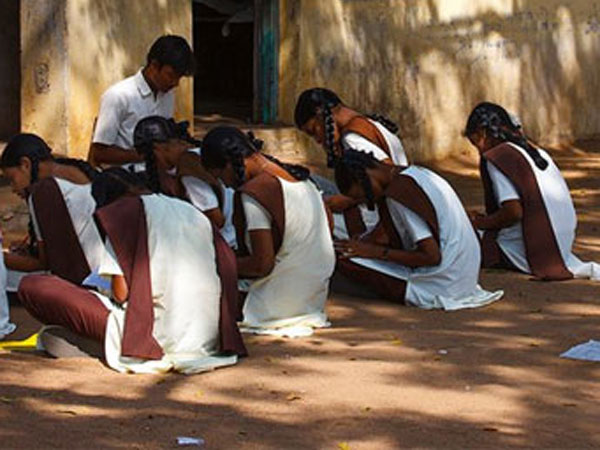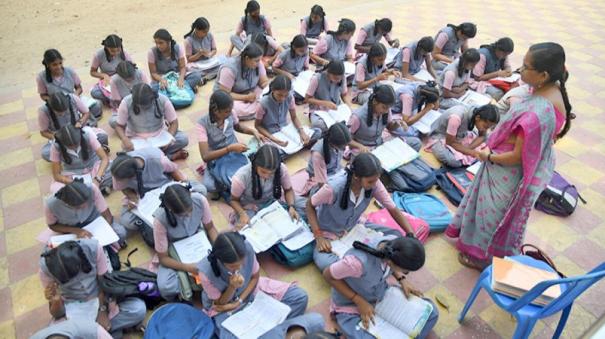The State Platform for common school system – Tamilnadu (SPCSS-TN) has released a report on the recent School Education Policy Document released by the Tamil Nadu Government, outlining the pros and cons of the document.
In a joint statement issued by SPCSS-TN President Rathinasabhapathy and General Secretary P. P. Prince Gajendra Babu.

We congratulate the Hon’ble Chief Minister, Government of Tamil Nadu for having demonstrated in clear terms that the State Government under the federal Constitution has the authority to evolve its own policy on education taking into account the specific needs of the people and the opportunities available in the respective States in order to contribute to the overall socio-economic development of India. Tamil Nadu, being the first State to come out with a State Policy, has set an example for other States to evolve State Specific Policy for educational development of the respective States that may lead to the overall educational development of India.
The non-availability of the Report of the High Level Committee (HLC) in the public domain and the announcement of the policy without placing the draft for discussion and ascertaining the views of the public, denied the democratic space for people to negotiate on certain proposals in the policy.
SPCSS-TN studied the State Education Policy and wishes to place the following before the Government of Tamil Nadu for its kind consideration and for taking necessary measures to address the concerns and strengthen the policy.
At the outset we wish to clarify the reason for which NEP 2020 is not acceptable.
The NEP 2020 is not grounded on the premises of the Constitution of India, but on the premises of the WTO GATS in order to safe guard the interest of the international financial capital. The NITI Aayog provides necessary inputs for formulating policy that will take care of the private players. The interest of the nation and development of people have no place in the NEP 2020.
 The NEP 2020 is manipulative and well-crafted to confuse people on the purpose of school study. The NEP 2020 is a clear road map to push the majority of the students into market as cheap semi-skilled labourers by luring them with various options and that is the purpose of multiple exits and multiple entries. It is well known, given the socio-economic and educational background of the families, generally the students who exit, will never enter again. There may be exemptions, exemptions cannot be generalized.
The NEP 2020 is manipulative and well-crafted to confuse people on the purpose of school study. The NEP 2020 is a clear road map to push the majority of the students into market as cheap semi-skilled labourers by luring them with various options and that is the purpose of multiple exits and multiple entries. It is well known, given the socio-economic and educational background of the families, generally the students who exit, will never enter again. There may be exemptions, exemptions cannot be generalized.
The PM SHRI that is considered to be the laboratory to test the NEP 2020 is nothing but a design to weaken the government school system and create a cult that will be ready to accept a sanskritised mono-cultural nation.
Understanding Kalaignar’s vision:
While Kalaignar’s centenary celebrations are completed and many memorials are being established to cherish his ideals and vision, it is very important that the School Education Department be guided by his vision of providing equitable access to education for all without any discrimination.
Kalaignar realised that inequalities and branding of schools results in affecting the students psychologically, leading to inferiority complexes that demotivate and result in weakening the self-confidence of school students. He recognized the need to remove the discriminatory structures and practices in the school education and provide equitable access to education for all children till they complete their school education i.e. Higher Secondary Course. That is the reason he used the term “Samacheer Kalvi” to convey the idea of “Equity in Education”.
Samacheer Kalvi should not be understood as confined to Common Syllabus and Common Board Exams. Dr. S. Muthukumaran, the Former Vice Chancellor and Chairperson of the Committee that drafted the Report on Samacheer Kalvi had explained the idea behind the entire process and the vision of the government while talking to the press.
The statement of Dr. S. Muthukumaran is reproduced in order to understand the vision of Kalaignar, the Five Time Chief Minister of Tamil Nadu. The Hindu Madurai Desk reported as follows on August 28, 2009:
“Stating that the student community at large would benefit immensely from the uniform system, Dr. Muthukumaran observed that the new system would pave way for bringing in “neighbourhood school concept” to the fore. “The objective of our committee’s recommendations was that there should be standard education in all schools. When there is equitable system, all schools will become good schools without any distinction in quality,” he felt.
It should be noted that even during the period when Kalaignar was the Chief Minister there were discriminatory structures and practices in the Government School System. His vision was to remove all discriminatory structures and practices and establish a system that will place all students equal in all sense. The Common Syllabus and Common Board Exam was a step towards that direction.
SPCSS-TN, in the affidavit filed before the High Court and Supreme Court in defence of Samacheer Kalvi, had clearly stated that the aim of Samacheer Kalvi is to establish Common School System with Neighbourhood schools and the Common Syllabus and Common Board Exam is only a step towards that direction. The Government headed by Kalaignar took the first step and before it could proceed to bring in total reform, in the very next year, there was a change in the government and the entire process was derailed for the reasons best known to everybody.
Kalaignar through his writing warned of dangers that could be sensed even at the stage of discussion on Draft National Education Policy and urged the Government and the people to strengthen the education of the State that is based on the principles of Social Justice.
In the 2021 election to the State Assembly, the people were clear in rejecting the NEP 2020 and gave their mandate for evolving a State Specific Policy that could end all discriminatory structures and practices in the education sector and establish a system that could provide equitable access to education for all at all levels.
Expectations on the State Education Policy – School Education (SEP – SE):
The policy being the vision statement of the Government of Tamil Nadu, should realise the constitutional goals of establishing a society of equals. It should give direction for the concerned department to formulate plans and strategies for the social transformation and emancipation of people who face different forms of oppression and denials.
Policies do not talk about technicalities. It will recognise the challenges and provide confidence to face the challenge. A policy will have clarity on government allocation of funds needed to realise the vision. A government policy cannot place the funding responsibility with the philanthropists.
A policy on school education should provide a road map for equitable access to education for all and a smooth transition from school education to higher education. The school education must aim to bring all to higher education and not push them out of mainstream education by luring them to get trained for a vocation. Making student job ready should not be the purpose of the school education.
The State Policy should be grounded on the premises of the Constitution of India. The Policy should set the curricular goals. The policy is neither a status report nor a technical document.
Fraternity as assured by the Constitution of India is possible only when social equity and gender equity are realised. The policy should ensure that at the completion of basic education in schools, the student should have a clear vision that caste is a discriminatory social practice and it is against the Constitution of India.
The policy should redesign the school assessment to ensure that the assessment is designed with necessary components to evaluate whether the student understood the contradictions between the social values thrust by the society on the individuals and the Constitutional values and resolve to adopt the Constitutional Values in her/his life.
Areas of Concern in the SEP -SE:
Model Schools and VETRI – the Schools for Excellence:
The concept of Model Schools, VETRI Schools and involvement of volunteers in curricular activities are against the concept of Samacheer Kalvi Policy and the principles of Social Justice.
A policy cannot sustain inequalities. The discrimination is grounded on the belief that the government will not be able to provide all facilities for all students and only selected students will be able to achieve what they desire.
This approach is not only against the spirit and vision of Kalaignar’s Samacheer Kalvi but also against the spirit and provisions of the Constitution of India.
The branding of schools as Model and VETRI – the Schools of Excellence are against Article 14 and 21. It negates the mandate given to the government by the Constitution of India through Article 41.
The society is based on caste, which is a discriminatory social practice. The graded inequality is prevalent in the society and forced on the people as social values, the social values are in contrast to the Constitutional values.
Expectations on the State Education Policy – School Education (SEP – SE):
The policy being the vision statement of the Government of Tamil Nadu, should realise the constitutional goals of establishing a society of equals. It should give direction for the concerned department to formulate plans and strategies for the social transformation and emancipation of people who face different forms of oppression and denials.
Policies do not talk about technicalities. It will recognise the challenges and provide confidence to face the challenge. A policy will have clarity on government allocation of funds needed to realise the vision. A government policy cannot place the funding responsibility with the philanthropists.
A policy on school education should provide a road map for equitable access to education for all and a smooth transition from school education to higher education. The school education must aim to bring all to higher education and not push them out of mainstream education by luring them to get trained for a vocation. Making student job ready should not be the purpose of the school education.
The State Policy should be grounded on the premises of the Constitution of India. The Policy should set the curricular goals. The policy is neither a status report nor a technical document.
Fraternity as assured by the Constitution of India is possible only when social equity and gender equity are realised. The policy should ensure that at the completion of basic education in schools, the student should have a clear vision that caste is a discriminatory social practice and it is against the Constitution of India.
The policy should redesign the school assessment to ensure that the assessment is designed with necessary components to evaluate whether the student understood the contradictions between the social values thrust by the society on the individuals and the Constitutional values and resolve to adopt the Constitutional Values in her/his life.
Areas of Concern in the SEP -SE:
Model Schools and VETRI – the Schools for Excellence:
The concept of Model Schools, VETRI Schools and involvement of volunteers in curricular activities are against the concept of Samacheer Kalvi Policy and the principles of Social Justice.
A policy cannot sustain inequalities. The discrimination is grounded on the belief that the government will not be able to provide all facilities for all students and only selected students will be able to achieve what they desire.
This approach is not only against the spirit and vision of Kalaignar’s Samacheer Kalvi but also against the spirit and provisions of the Constitution of India.
The branding of schools as Model and VETRI – the Schools of Excellence are against Article 14 and 21. It negates the mandate given to the government by the Constitution of India through Article 41.
The society is based on caste, which is a discriminatory social practice. The graded inequality is prevalent in the society and forced on the people as social values, the social values are in contrast to the Constitutional values.
The multi-track school system within the Government Schools that provides for schools, model schools and VETRI the schools for Excellence will further widen the inequality and provide the basis for justification of social discrimination.
Separate structures within government schools will never help in strengthening the Government schools. It will only weaken.
The statement that slowly the model schools will be expanded in order to make all schools as Model Schools is only an illusion. It is a carefully crafted design on the lines of NITI Aayog suggestions to close the non-viable schools by merging several government schools.
Branding of certain schools within the Government Schools is nothing but a design to weaken the government schools and slowly merge several schools into one school and thereby reduce the number of government schools. The final goal is to handover the management of the remaining government schools to the private parties as it is being done with the Sainik Schools.
The State policy is expected to remove all discriminatory structures and practices in school education and provide for equitable access to quality education for all.
Vocational Training, Curricular Developments, Practical classes, Experiential Learning:
Practical and Theory classes are different from experiential learning.
Experiential learning is different from vocational skilling/training.
Vocational Stream in Higher Education is different from Vocational Training for Higher Secondary Students. Vocational Stream is not for ensuring job ready youth.
The students getting admitted into a vocational stream may be focused on a particular technological or engineering course. The students opt vocational stream in higher secondary courses not for immediate job opportunities but to pursue higher studies in the area of their interest.
The State Policy aims at providing career guidance from secondary level onwards. The secondary level starts from class 9. Career guidance from secondary level will only motivate the students to get into a job to meet the immediate financial needs of the family. Youngsters born in the working class families will not be willing to see their parents suffer in poverty. The students at secondary level must only be informed of educational opportunities in different fields of study.
In vocational training, the students are pushed towards a vocation and the training is aimed to help the student secure employment. This approach will drive the students, even before completing their childhood, to enter the job market as just semi-skilled cheap labourers.

The curricular reforms are needed not only for vocational streams courses but for every course including the General Stream.
Students pursuing any subject should have the opportunity to visit the connected industry, it may be hospital, hospitality, financial institutions, agriculture fields etc. They should visit for observation and to understand how the theory they learn is practiced.
Students pursuing an agriculture course will study the latest development in agriculture practice, the new technology and scientific approach in production, they may also study the economic impact and needs of agricultural production with relation to the population size and expected growth. The purpose is not to train the students to learn which crops yield better profit and become a cultivator of that crop.
Students will visit agriculture fields, plantations and connected industries to understand the theory they study and relate them to the agricultural practices in the place of their visit. They don’t visit to get trained for becoming an agriculturalist themselves.
 Experiential learning is being confused with vocational training.
Experiential learning is being confused with vocational training.
The policy should clarify the intention, whether the course is designed for the student to pursue higher studies or push them into a job.
Certain communities still have no representation in higher education. As long as the burden of family poverty falls on the younger ones in the family, this stagnation will continue. This will also affect the GER in higher education. The welfare state should provide means for the family to survive, and encourage the younger ones to pursue higher education.
The School Education should provide opportunities for holistic development of the individual. School Education should help the child to grow into an adult with full confidence and knowledge to remove all forms of disparities and discriminations and to establish a society of equals as envisioned by the Constitution of India.
The purpose of school education is not to enhance workplace readiness. The purpose of school education is to help the students pursue higher studies.
The Government Schools and Government Grant in Aid Schools:
The State policy should treat all aided schools on par with government schools. The policy document provides various technical details but fails to state the number of Government Aided Schools and the Government Schools under various departments and number of permanent teacher posts.
Staff Appointments:
Extracting work from the teacher qualified personnel without any guarantee for permanent employment and meagre wages just for the period of their service is in violation of Article 43 of the Constitution of India. Permanent teaching and non-teaching staff are must for continuous formative assessment. They are the lifeline of school education. The policy should direct appointment of all staff on permanent posts.
It is the duty of the teachers to ensure basic literacy and numeracy. The age appropriate syllabus and textbooks are meant for the purpose. The entry of volunteers in the curricular activities will undermine the purpose of school education.
Financial Commitment:
The policy should not be expected to be implemented through volunteerism and philanthropic contribution. The entire funds needed for the school education should come from the budgetary allocation.
Transition from School Education to Higher Studies:
The State policy should clearly state that the scores of the Board Exams conducted at the end of Higher Secondary Courses will be the eligibility for entering higher studies and there will be no other entrance or eligibility test as far the State Government Colleges and Universities are concerned in general as well as professional courses.
The policy should clearly state that the curriculum and syllabus will be designed for each subject in order to ensure that the students will be fully prepared to pursue their higher studies in the respective fields and will be capable of mastering in the subjects concerned. The policy should state that the evaluation through board exams will test the competence of the students in all aspects to ensure that the students are fully prepared to undergo higher studies in the respective fields.
The policy on higher education is yet to be released. The State Education Policy will be complete only when the Policy on Higher Education is also released.
The policy on higher education should be clear in ensuring full funding for all Government and Aided Colleges, and Government Universities. The full grant should be provided by the Government. The University and affiliated college system should continue. Each University has its own uniqueness and nobody including TANSCHE should be permitted to interfere through Common Syllabus and other modes.
The policy on higher education should reject Outcome Based Education and evaluation based on OBE. The Blended learning and OBE are to encourage campus-less study and aimed at driving the students to market as semi-skilled cheap labourers. The Policy on higher education should be designed more carefully in order to strengthen and expand the Government Higher Education Institutions.
The student organisations, the educational bodies and educationists have come out with various suggestions to improve and strengthen the policy. Hallmark of democracy is to hear and respond to criticism. We sincerely expect that the Government will approach the issue democratically in order to strengthen the policy. If the policy is to be implemented, without addressing any of the issues raised by various forums, it will have a disastrous effect on the Government Funded School Education System that has been built on the principles of Social Justice.
We earnestly request the Hon’ble Chief Minister to examine the concerns expressed and hold direct consultation with all members of the High Level Committee and the organisations and individuals who have presented their suggestions for strengthening the State Education Policy – School Education.
— Angusam News Desk.










Comments are closed, but trackbacks and pingbacks are open.